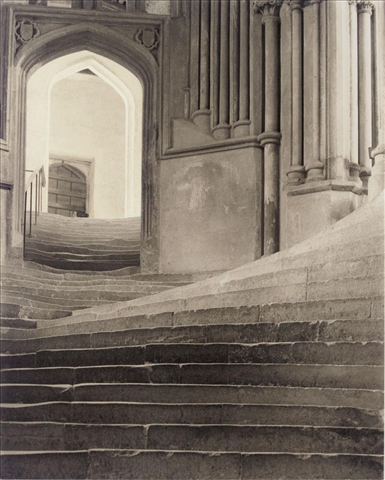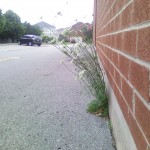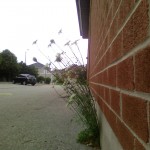Aug 28, 2008
剛放下電話,再讀手上的書,遇上這段文字,和剛才電話筒對邊的心態,形成強烈的對比:
If our first understanding of God is more about his anger and judgement than about his love, mercy and generosity, it is not only natural but indeed inevitable that we come to outwork these values ourselves. If we believe that God doesn’t ‘take’ to those outside the church, we too, in turn, will begin to despise or patronize them. Each of us is made in the image of our god; our view of God’s character will reflect itself in our attitudes, behaviour, tone and body language. Behaviour is always the echo of belief. (Steve Chalke, Intelligent Church, p21)
越來越發覺,天上的爸爸每天藉各式各樣的信息,對我說話的時候,甚是幽默。
Aug 1, 2008

From Phaidon’s The Photo Book:
This picture, of the stairs leading to the Chapter House in Wells Cathedral, was always meant to be understood in terms other than purely architectural ones. The steps themselves ripple and look increasingly like waves building in an ocean as they mount towards the lighted space beyond. The stairs seen rising to the right could be a great wave on the point of breaking, thus representing a danger to the traveller or pilgrim. In the middle is a cut block of stone, symbolizing a steadfast soul put in place by the Divine Architect. The point, though, is not just that the steps look oceanic but that they have been worn that way by generations of use, until their significance had been inscribed into the very fabric of the building. Evan’s tendency was always to look for a meaning already present, making him very respectful of appearances as given and thus an early advocate of ‘straight’ photography.
[link: narrative and ontology]
Jul 10, 2008
 很怕信徒當中流傳的「太理想」文化。
很怕信徒當中流傳的「太理想」文化。
用最簡單的言語:「太理想」的文化,就是信徒用以逃避/減輕,因成了基督徒,隨之而來對新生活方式的要求。
舉例:從聖經而歸納出的信仰原則(A),因為與信徒一般生活經驗的落差很大,於是信徒就用「這樣說太理想化了!」之類的說話,試圖將(A)解釋掉(explained away)。
然而在過程中,沒有自省、沒有不妥,因為此言一出,問題便不再在「不能完成」的我們,而是那「不能落實」的信仰原則。
今天,我們讀聖經的時候,是以甚麼心態來讀的呢?我還是老套得很,仍是以「我應該怎樣?」來 engage主的話。我的底線是:每當看見自己生活的經驗與經文所指的有差異時,我會認定問題在我、不在神。我從不會說聖經「太理想」,因為這理想,正是神的目標——創造天地、救贖天地的主,定下怎樣的目標,不是我這個受造物可以指指點點。對我來說,真正的問題永遠是,我要站在哪一邊:是配合這個目標的一邊?還是阻礙這個目標實現的一邊?
不錯,站著配合目標的一邊,絕不等於全可以做到。我會失敗,神亦知道我會失敗。失敗了,不要緊,站起來,卻要拒絕回到那阻礙目標實現的一邊,永不可說這是「太理想」。站起來,再想想我還可以怎樣落實祂的話。這個,永遠是我的責任,不能逃避、不能減輕。
究竟我要說到那時,人才能明白:我們是活於兩個世代(the Current Age and the Age to Come)相撞、重疊的時候。舊的生活已沒有出路,新生活的mandate已經出爐;這不是「理想」,而是耶穌在十字架上打開了的新可能。然而,我們今天卻不斷的對祂說,「不可能、不可能、太理想、太理想…」
一日我們仍然以「理想」來看待耶穌的教導,我們就是繼續將新布補在舊衣服、新酒倒進舊皮袋(太9.16-17)。耶穌早已一拼對這樣的人提出了警告:
「破的只會更大。」
Jul 1, 2008
上週末是老婆大人牛一,雖然正日有團契,翌日我們也一起外出晚飯。
誰不知那家「XX廚房」,訂枱與否還是要呆等,帶著一家有老有嫩,終於過檔鄰近的「XX豐」。
一邊笑著荷包因此慳了不少,一邊享受著家人難得的相聚。
不過,最不懈的,還是為何老婆生日,女兒卻會有禮物?!
Jun 4, 2008
After all the talks on
church visions,
directions,
long-term and short-term
goals and
targets;
After all the discussions on whether a community is
emotionally healthy,
spiritually gratifying,
purpose-driven,
missional,
I find there is still one key component that is missing from a group or an institute that can not implement what was planned —
That is, people are downright lazy.







